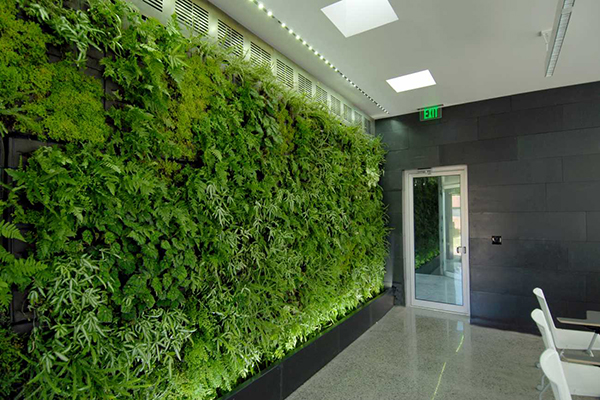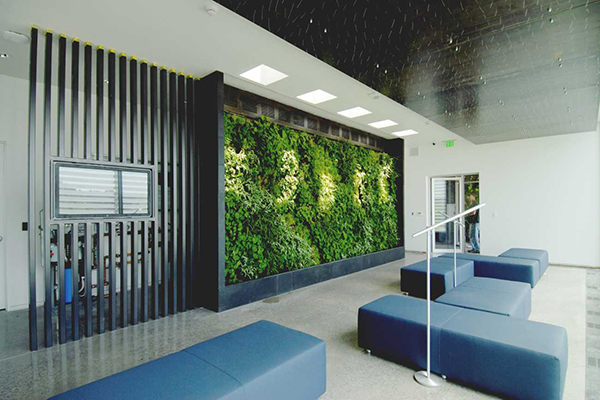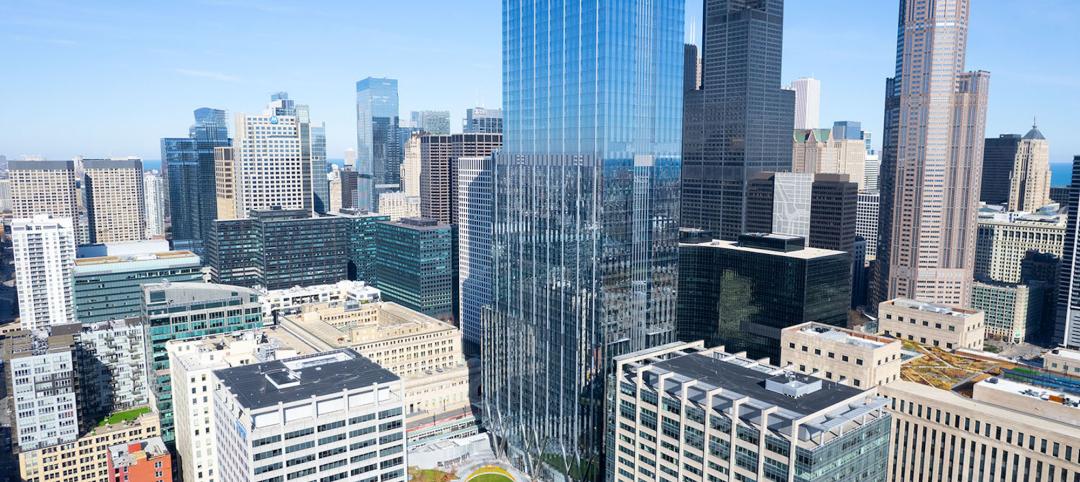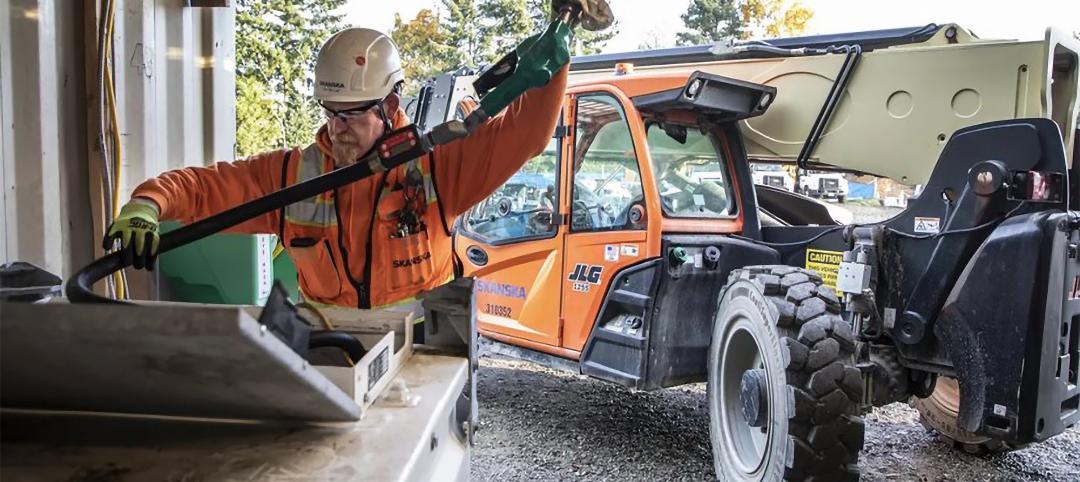The Center for Sustainability at Johnson County Community College (JCCC), Overland Park, Kansas, set aggressive goals for the College, including becoming a 100% renewable energy campus by 2050. This commitment affected every building project on campus, including Galileo’s Pavilion, a 3,000-square-foot academic building. Super-efficient practices and products, including Mitsubishi Electric Cooling & Heating Variable Refrigerant Flow (VRF) technology, have made Galileo’s Pavilion a true showcase of sustainability and earned LEED® Platinum certification.
The JCCC contacted Studio 804, a not-for-profit in Lawrence, Kansas, comprised of KU School of Architecture, Design and Planning graduate students. These students design and construct technologically sophisticated, green buildings under the direction of Dan Rockhill, distinguished architecture professor and Studio 804 founder. Rockhill said, “We designed Galileo’s Pavilion using our current knowledge of sustainable design. We took advantage of the daily and seasonal cycles of nature to passively cool, heat and daylight the building, as well as supply electricity and utility water.”
For HVAC, Rockhill said, “We had three distinctly separate spaces. Although they’re in the same building, the loading on them is different. So that resulted in three separate air-conditioning and heating solutions” – or, zoning. “We pride ourselves on promoting sustainable everything, so HVAC is no exception.” VRF was the clear choice.

Rockhill had been impressed with Mitsubishi Electric VRF on a recent project. “Mitsubishi [Electric] is a leader in its field. Many of the others follow, but Mitsubishi [Electric] developed the variable refrigerant concept. For Galileo’s Pavilion, we wanted the most technologically advanced equipment in the industry. So VRF and its capacity to simultaneously cool and heat all of the spaces within the building was a fit.”
He continued, “Mitsubishi [Electric] was also very generous in working on the engineering aspect of the Center for Design Research. Mitsubishi [Electric] gets passive solar, and gets that it’s the sum of the total of all the parts that makes the systems positive. And there was never any pushback from them. It was always, “Yeah, that’s great.”
“Installation went quite well. The Mitsubishi [Electric] units are compact and easy enough to install that the whole thing really was pretty simple,” said Rockhill.
“The school monitors the whole thing,” explained Michael Rea, JCCC’s sustainability project manager, “through our building automation system. The Mitsubishi [Electric] system is integrated so we can see humidity or change set points, for example.”
He continued, “Everything with the Mitsubishi [Electric] system has been going well. No compressor failures, no leaks, no fan problems, nothing. Our maintenance is easy, too – just changing the filters and making sure the condensers are clean.”
Another sign of success: LEED Platinum certification. Rea said, “For us in the Center, we were excited to get above Silver, our current standard. Galileo’s Pavilion is a showcase about what a sustainable building can be on a campus. We were also honored to receive the 2013 CSI Kansas City Chapter Innovation in Sustainability Award for the building.”
Related Stories
Sustainability | Jan 9, 2023
Innovative solutions emerge to address New York’s new greenhouse gas law
New York City’s Local Law 97, an ambitious climate plan that includes fines for owners of large buildings that don’t significantly reduce carbon emissions, has spawned innovations to address the law’s provisions.
Codes and Standards | Jan 9, 2023
EPA reverses course on clean water rule changes enacted by Trump administration
After long legal battles and extensive debate over the expansiveness of the Clean Water Act, the Environmental Protection Agency repealed changes enacted by the Trump administration.
Cladding and Facade Systems | Dec 20, 2022
Acoustic design considerations at the building envelope
Acentech's Ben Markham identifies the primary concerns with acoustic performance at the building envelope and offers proven solutions for mitigating acoustic issues.
Sponsored | Resiliency | Dec 14, 2022
Flood protection: What building owners need to know to protect their properties
This course from Walter P Moore examines numerous flood protection approaches and building owner needs before delving into the flood protection process. Determining the flood resilience of a property can provide a good understanding of risk associated costs.
Green | Dec 9, 2022
Newly formed Net Zero Built Environment Council aims to decarbonize the built world
Global management consulting firm McKinsey recently launched the Net Zero Built Environment Council, a cross-sector coalition of industry stakeholders aiming to decarbonize the built world. The council’s chief goal is to collaboratively create new pathways to cut greenhouse gas emissions from buildings.
Office Buildings | Dec 6, 2022
‘Chicago’s healthiest office tower’ achieves LEED Gold, WELL Platinum, and WiredScore Platinum
Goettsch Partners (GP) recently completed 320 South Canal, billed as “Chicago’s healthiest office tower,” according to the architecture firm. Located across the street from Chicago Union Station and close to major expressways, the 51-story tower totals 1,740,000 sf. It includes a conference center, fitness center, restaurant, to-go market, branch bank, and a cocktail lounge in an adjacent structure, as well as parking for 324 cars/electric vehicles and 114 bicycles.
Energy Efficiency | Dec 6, 2022
Washington state’s Building Code Council mandates heat pumps in all new residential construction
The Washington State Building Code Council has voted to require heat pumps for all new residential construction starting in July 2023. The new mandate has drawn criticism over concerns that it will add costs to housing construction, especially given current supply chain challenges for heat pumps.
Geothermal Technology | Dec 6, 2022
Google spinoff uses pay-as-you-go business model to spur growth in geothermal systems
Dandelion Energy is turning to a pay-as-you-go plan similar to rooftop solar panel leasing to help property owners afford geothermal heat pump systems.
Sustainability | Dec 5, 2022
5 ways sustainability professionals can help reduce construction's carbon footprint
Mark Chen, Sustainability Manager at Skanska, has found five specific ways to help the construction industry reduce its carbon footprint.
Legislation | Nov 23, 2022
7 ways the Inflation Reduction Act will impact the building sector
HOK’s Anica Landreneau and Stephanie Miller and Smart Surfaces Coalition’s Greg Kats reveal multiple ways the IRA will benefit the built environment.
















